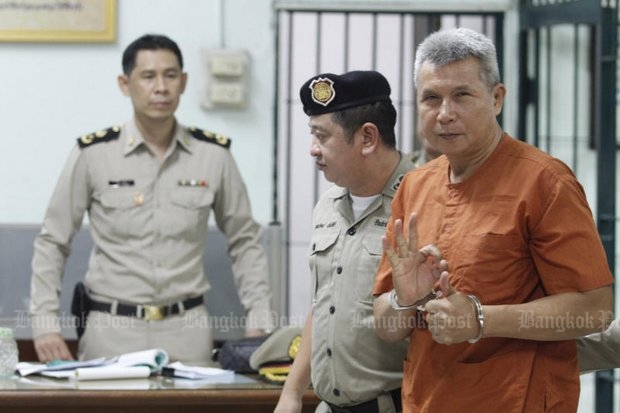
This week 10 years ago, as I was wrapping up an interview with the Grand Duke of Luxembourg who joined other monarchs in celebrating HM King Bhumibol Adulyadej's 60th anniversary on the throne, he asked me a question that overwhelmed me so much that I could not immediately answer but had tears run down my face.
That questioned was: "Why do Thais love the King so much?"
It was an embarrassing moment as the royal visitor handed me a tissue and soothingly said: "It's alright". After a brief pause, I offered him a simple answer: "Thai people feel connected to the King and we just love and respect him, and appreciate his devotion and tireless outreach to marginalised people. He is just a great man."
This was a time Thais rejoiced and were happy for His Majesty who celebrated the auspicious occasion.

Achara Ashayagachat is Senior News Reporter, Bangkok Post.
At that time, rumours about political tussles between then prime minister Thaksin Shinawatra and a network of ultra-royalists were intense.
Unsurprisingly, a "threat to the monarchy" was cited as one of the reasons for a coup against Thaksin by Gen Sonthi Boonyaratglin on Sep 19, 2006.
Since then, our society has witnessed a surge of lese majeste suits, reaching into the hundreds between January 2006 and May 2011, compared to just a few cases a decade earlier.
For example, there were 478 counts of the LM offence in 2010, up from 164 in 2009, 77 in 2008, and 126 counts in 2007, according to an exhibition at the Democracy Monument on Oct 17, 2011.
Observers attribute the increase of cases to intense political polarisation, following the 2006 military coup and concerns over the King's health.
During his birthday speech in 2005, His Majesty let the public know he was open to criticism: "Actually, I must also be criticised ... Because if you say the king cannot be criticised, it means that the king is not human."
The underlying issue of Section 112, which seeks to punish those who defame the King, the Queen, and the heir to the throne, is that more often than not, it is used -- or abused -- as a political tool in cleansing or taking revenge on individuals or political opponents.
The Computer Crime Act has added heavy-handedness to the lese majeste law.
A prime example is the case of Prachatai webmaster Chiranuch Premchaiyaporn who was sentenced to jail for eight months with a one-year suspended term for failing to promptly delete comments that insulted the monarchy on the webboard.
There is also the case of Ampon Tangnoppakul, a poorly-educated old man, who was given a 20-year sentence for sending SMS messages with lese majeste content.
His death while in prison triggered wider concerns over the wrong use of the lese majeste law and it prompted activists as well as academics throughout the nation to campaign for amendments to the legislation. However, the move was eventually shot down by parliament during the Yingluck Shinawatra administration.
After the May 14 coup, the Prayut Chan-o-cha administration has further stepped up the use of Section 112 and the Computer Crime Act.
According to the Internet Law Reform Dialogue (iLaw), there are now 68 lese majeste cases relating to opinions, poems, cartoons, and comments online during the last two years, excluding the 37 fraud cases that are linked to names of the royal family. Two suspects have died during military detention.
The new situation under the Prayut administration includes the trial of lese majeste lawsuits in the Military Court and an interpretation of the lese majeste laws by the judicial system that goes beyond the basis of law.
Military courts normally impose harsher sentences for those charged with lese majeste compared to civilian courts.
In August 2015, the Bangkok Military Court sentenced Pongsak Sriboonpeng to 60 years in prison for six alleged lèse majesté Facebook posts (later reduced to 30 years when he pleaded guilty).
It was Thailand's longest recorded sentence for a lèse majesté case.
Also in 2015, a Bangkok man was arrested and detained without bail allegedly for making sarcastic online comments about Khun Tongdaeng, His Majesty's pet dog.
Another case occurred in Kampaengpaeng Phet with four people charged with making false claims that they were officials in the court of HRH Princess Maha Chakri Sirindhorn.
One of the defendants insisted Section 112, which is limited to Their Majesties and the Heir, should not be applied in the case and asked the court to drop the LM charge.
I myself have come across two other fraud cases involving business partners who abused the lese majeste law to resolve their disputes.
As a result, Settawat (last name withheld), 50, a construction businessman from Bang Khen has been detained since May 11 with no bail.
The other businessman, Wisit, 66, has also been jailed for 10 months, also without bail.
The abuse of Section 112, which is on the rise, does more harm than good to the high institution.
I wonder if any self-appointed royalists will share my heavy-heartedness at a time when we are celebrating His Majesty the King's 70 years on the throne.
